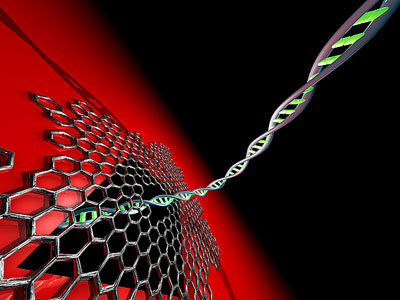| Nov 16, 2012 |
Investment of 51 million euro for nanotechnology in Delft and Leiden
|
|
(Nanowerk News) With an amount of 51 million it is one of the largest ever Dutch investments in fundamental science: scientists of TU Delft and Leiden University will be embarking on the research programme ‘NanoFront’ to explore the frontiers of nanoscience in the coming ten years.
|
|
“We will be observing, monitoring and developing material at the ultimate scale: atom for atom, in a way that was completely inconceivable a few years ago”, says research leader Cees Dekker, Director of the Delft Kavli Institute. “We will be investigating the limits of the nano world, both the quantum world in materials as well as the building blocks of living cells; the two most exciting fields in nanoscience. Moreover, we will be developing new technologies to make videos of the nano world in real time.”
|
|
An amount of 51 million euro has been made available for NanoFront. The Ministry of Education, Culture and Science announced today that it will be funding 36 million euro from the ‘Gravity Programme’ of the Netherlands Organisation for Scientific Research (NWO). The two universities are jointly making an amount of 15 million euro available for NanoFront. The Gravity Programme is the NWO’s ‘Champions League’ with which the Netherlands is financing research at the absolute cutting edge of international research.
|
 |
| Artistic rendering of a DNA molecule translocating through a graphene nanopore, an example that symbolizes how the three pillars of NanoFront come together: nanotechnology (to shape and visualize the nanopore with atomic precision), quantum nanoscience (in the graphene monolayer) and bionanoscience (in the DNA molecule). (Image: Cees Dekker lab TU Delft/Tremani)
|
|
From ‘surprises’ to ‘devices’
|
|
“The developments in nanoscience are fascinating”, says Dekker. “The discovery of Majorana fermions has for example opened up a whole new field that we aim to explore further. And we will be shifting from ‘surprises’ to ‘devices’, or, in other words, the fundamental discoveries that we are making will find real physical applications in the coming years. Look at quantum mechanics at the nanoscale, for instance. Questions that arise in that field are, for example: How large can a quantum object become while still behaving in accordance with the laws of quantum mechanics? The next challenging step is to see if we can also make working computer circuits, such as quantum electronics, with molecules. These are developments that will allow us to calculate much faster than with current computers”, says Dekker.
|
|
“And through bionanoscience, the interface between nanotechnology and biology, we are learning more and more about the building blocks of living cells. That also raises intriguing questions. How exactly does this work at the molecular level and can we, for example, use this as a basis for developing nanomedicine? And can we start using these building blocks to build functional new structures, or even create something like the components of a living cell? Examining these questions provides us with real insights. To quote the famous physicist Richard Feynman: ‘What I cannot create, I do not understand’.
|
|
Another task is to make this world visible and, believe me, that’s a serious challenge at the nanoscale. One element of NanoFront is therefore to develop new nanotechnologies enabling us to visualize processes at the atomic level and in real time, for example within a living cell or in an industrial reactor.”
|
|
Leading research
|
|
TU Delft’s Rector Magnificus, Karel Luyben, is proud of the nano research. “NanoFront is a dynamic powerhouse involving the best nano researchers of TU Delft and Leiden University. These are scientists who are international trendsetters at the forefront of their fields, such as Cees Dekker, Leo Kouwenhoven and Henny Zandbergen of the Kavli Institute at Delft and Carlo Beenakker, Joost Frenken and Michel Orrit of the Leiden Institute of Physics. Furthermore, NanoFront also provides an impulse to encourage up-and-coming talent at the highest level, for example, Nynke Dekker and Lieven Vandersypen in Delft and Tjerk Oosterkamp in Leiden.” Nanosciences represent a strong domain in both Delft and Leiden, generating a large number of publications in magazines such as Nature and Science. Earlier this year, Leo Kouwenhoven’s group caused a major sensation among physicists with the discovery of the Majorana particle. Nano research in Delft is financed by the Kavli Foundation. The University houses one of the four ‘Kavli Institutes of Nanoscience’ along with Harvard, Caltech and Cornell Universities.
|
|
New scientists
|
|
NanoFront will result in a major increase in the numbers of nanoscientists at Delft and Leiden. Dekker anticipates filling around one hundred new positions, including seven for prominent international scientists. “We will continue to build on the success of the Casimir Research School in which Leiden and Delft have been working together for almost ten years now. Casimir provides the programmes for PhD students of both institutes and is an important factor underlying the success of our nano research.”
|

